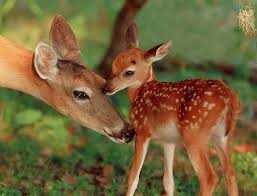fawn
英 [fɔːn]
美 [fɑːn]
- vi. 奉承
- n. 小鹿;浅黄褐色;小动物
- adj. 浅黄褐色的
- vt. 生(小鹿或小动物)
- n. (Fawn)人名;(英)福恩
使用频率:

记忆方法
1. fetus => fawn.
2. fain => fawn.
3. 谐音“逢”----逢迎。
2. fain => fawn.
3. 谐音“逢”----逢迎。
中文词源
fawn 浅黄褐色的,幼鹿
来自拉丁语fetus, 生育,幼兽,字母t脱落,结尾鼻音化,用来指幼鹿及鹿的颜色。词义演变参照deer.
fawn 巴结词源同fain, 乐意的。词义贬义化。
英语词源
- fawn
-
fawn: Fawn ‘young deer’ [14] and fawn ‘grovel’ [13] are two distinct words. The latter did not always have the negative associations of ‘servility’ which it usually carries today. Originally it simply referred to dogs showing they were happy – by wagging their tails, for instance. It was a derivative of Old English fægen ‘happy’, an adjective of Germanic origin which survives in the archaic fain ‘willingly’ (as in ‘I would fain go’). Fawn ‘young deer’ comes via Old French faon ‘young of an animal’ and Vulgar Latin *fētō from Latin fētus ‘giving birth, offspring’ (whence English foetus).
The general sense ‘young of an animal’ survived into the early 17th century in English (James I’s translation of the Psalms, for instance, in 1603, has ‘the fawn of unicorns’ in Psalm 29, where the Authorized Version simply refers to ‘a young unicorn’), but on the whole ‘young of the deer’ seems to have been the main sense of the word from the 15th century onwards.
Its use as a colour term, after the pale yellowish brown of a young deer’s coat, dates from the 19th century.
=> fain, foetus - fawn (n.)
- "young deer," mid-14c., from Anglo-French (late 13c.), Old French (12c.) faon, feon "young animal," especially "young deer," from Vulgar Latin *fetonem (nominative *feto), from Latin fetus "a bringing forth; an offspring" (see fetus). It was used of the young of any animal as recently as King James I's private translation of the Psalms, but the sense has been mainly of deer since 15c. Color use is by 1881.
- fawn (v.)
- Old English fægnian "rejoice, be glad, exult, applaud," from fægen "glad" (see fain); used in Middle English to refer to expressions of delight, especially a dog wagging its tail (early 13c.), hence "court favor, grovel, act slavishly" (early 14c.). Related: Fawned; fawning.
权威例句
- 1. A small brown fawn hopped across the trail in front of them.
- 一只棕色的小鹿蹦跳着穿过他们面前的那条小路。
- 2. The fawn ran to the top of the ridge.
- 小鹿跑上山脊。
- 3. Underlings fawn on their bosses.
- 奴才巴结主子.
- 4. There was something familiar about him, his fawn raincoat, his thinness, the way he moved.
- 他有点眼熟——浅黄褐色雨衣,瘦削的身影,走路的姿态。
- 5. You must guard against those who fawn upon you and bow obsequiously before you!
- 对阿谀奉承、点头哈腰的人要格外警惕!
